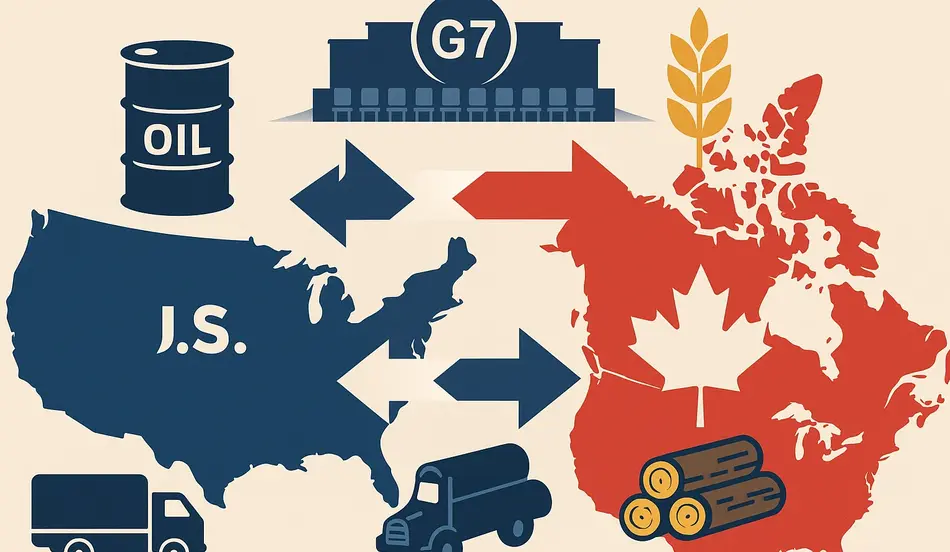Recent developments in US Canada trade relations 2024 suggest significant progress as both nations move closer to a potential trade agreement. With Canadian Prime Minister Mark Carney and US President Donald Trump exchanging negotiating documents and preparing for face-to-face discussions at the upcoming G7 summit in Alberta, the economic relationship between these key North American partners appears to be entering a new phase.
The Current State of US Canada Trade Relations 2024
Diplomatic Communications Intensify
The Canadian government recently confirmed that Prime Minister Carney has been in direct communication with President Trump, though officials emphasize they won’t be negotiating in public. This diplomatic approach to US Canada trade relations 2024 represents a strategic effort to manage both public expectations and market reactions during sensitive negotiations.
“Prime Minister Mark Carney and President Donald Trump have exchanged some documents with negotiating positions on security, tariffs, and trade,” according to sources familiar with the discussions. However, these exchanges are being characterized as “pretty much the normal exchange of documents between two sides in a negotiation.”
What’s particularly noteworthy about the current US Canada trade relations 2024 situation is that despite the document exchanges, sources indicate the two sides are not yet prepared to exchange a comprehensive draft agreement. This suggests that while progress is being made, significant details remain to be resolved.
G7 Summit: A Potential Turning Point
The upcoming G7 summit in Alberta presents a critical juncture for US Canada trade relations 2024. US Ambassador to Canada Pete Hoostra acknowledged the significance of this meeting, stating: “They were both going to be at the same place. They’re both going to be in Canada. And you know there’d be lots of questions if there isn’t something that is announced.”
This diplomatic signaling indicates mounting pressure for the leaders to demonstrate tangible progress when they meet face-to-face. The summit will bring together the world’s most influential economies, creating both opportunity and scrutiny for bilateral discussions between Canada and the United States.
Global Context: Broader Trade Developments
US-China Trade Agreement Claims
The evolving US Canada trade relations 2024 situation is unfolding against a backdrop of other significant international trade developments. Most notably, President Trump recently claimed that a trade deal with China “is done,” following high-level meetings between officials in London.
According to reports, this purported agreement would maintain substantial 55% tariffs on Chinese imports while China would impose a 10% tariff on US goods. In exchange, China would provide the US continued access to rare earth minerals, while the US would ease threats targeting Chinese students on American campuses.
However, economic experts note that leaving such hefty tariffs in place remains problematic for both nations. American consumers continue bearing higher prices, while reduced demand for goods weighs heavily on China’s economy. As one analyst observed, “The downward pressures are significant on China. And in that sense, there’s a lot of incentive to come to the trade deal and somehow get these tariffs off.”
This global trade context creates both challenges and opportunities for US Canada trade relations 2024, as North American economic integration must now navigate an increasingly complex international landscape.
Domestic Political Considerations
Canadian Perspectives
Within Canada, the government faces pressure to secure favorable terms while managing various domestic constituencies. The upcoming G7 summit will not only feature trade discussions but also controversial diplomatic engagements, including an invitation to India’s Prime Minister despite tensions related to allegations of Indian government involvement in the murder of a Sikh activist in British Columbia.
This complex political environment means that any US Canada trade relations 2024 agreement must balance economic priorities with security concerns and community sensitivities. As Liberal MP Souk Diwal expressed after meeting with Prime Minister Carney: “I’m saying that it’s not a good idea, but now he’s invited. We have to move forward and we have to see our prime minister when it comes to he is alarmed about the issues and he will be very strong when it comes to dealing with those issues that are important to Canadians.”
International Diplomatic Engagements
The G7 summit will also feature bilateral meetings between Prime Minister Carney and UK Prime Minister Kier Starmer, who will visit Ottawa before heading to Alberta. Additionally, Brazil’s President Luis Anasio Dilva (commonly known as Lula) has accepted Carney’s invitation to attend the summit following a recent phone call.
These diplomatic engagements highlight how US Canada trade relations 2024 exist within a broader web of international relationships that both countries must navigate carefully.
Economic Implications of US Canada Trade Relations 2024
Global Economic Concerns
The stakes for successful US Canada trade relations 2024 negotiations are particularly high given recent warnings from the World Bank that global economic growth is on track for its weakest decade since the 1960s. Trade tensions between major economies are cited as a significant factor weighing down worldwide economic performance.
For Canada, which relies heavily on trade with the United States, securing stable and favorable trading terms is essential for economic stability and growth. According to recent economic data from Statistics Canada, the US remains Canada’s largest trading partner by a substantial margin, with bilateral trade exceeding $800 billion annually.
Sector-Specific Impacts
Various Canadian industries are watching US Canada trade relations 2024 developments with particular interest:
- Energy sector: Alberta’s ambitions to become an energy superpower include proposals for a new pipeline from Alberta to BC’s north coast, which would require supportive trade policies
- Manufacturing: Automotive and industrial manufacturing sectors rely on integrated supply chains across the border
- Agriculture: Canadian farmers depend heavily on access to US markets
- Technology and services: Growing sectors seeking protection for intellectual property and market access
A comprehensive trade agreement would need to address these diverse sectoral interests while managing potential areas of conflict.
Hiring in International Trade and Commerce?
Looking for professionals with expertise in cross-border business, regulatory compliance, or supply chain management? Post your positions for free with WhatJobs and connect with qualified candidates familiar with US Canada trade relations 2024 developments.
Alberta’s Energy Ambitions
Pipeline Proposals and Trade Implications
Alberta Premier Danielle Smith has articulated a vision for her province as an energy superpower, with infrastructure development playing a key role. At a recent Global Energy Show, Smith advocated for “a 42-inch Bammen pipeline connecting Alberta to Tidewater at the port of Prince Rupert in BC.”
This infrastructure proposal connects directly to US Canada trade relations 2024, as energy exports and environmental policies remain central to bilateral economic discussions. Smith argues such development is essential to meet what OPEC projects will be a 24% jump in global oil demand over the next 25 years.
“Our projections are that oil demand will go and surpass 120 million barrels a day by 2050. Simply put, ladies and gentlemen, there is no peak in oil demand on the horizon,” an OPEC representative told industry attendees.
Competing Energy Forecasts
However, alternative projections present a different picture of future energy needs. “There are plenty of other forecasters and agencies and firms who have very different results,” noted one energy analyst. “The International Energy Agency calls for peak oil demand in 2030 and then depending on which scenario you favor, it could either plateau out to 2050 or it could start dropping.”
These competing visions create significant investment risk for major infrastructure projects and highlight how US Canada trade relations 2024 must navigate not just current economic realities but divergent forecasts about future market conditions.
Housing Initiatives and Economic Stimulus
GST Relief for Homebuyers
Against the backdrop of trade negotiations, the Canadian government is pursuing domestic economic initiatives that could interact with broader North American economic integration. The federal government’s latest housing plan would eliminate federal sales tax on newly built homes worth up to $1 million, potentially saving first-time homebuyers approximately $27,000.
According to the Parliamentary Budget Office, over 71,000 new builds would qualify for this GST relief over the program’s lifetime, at a projected cost of $1.9 billion over six years. Such domestic economic stimulus could strengthen Canada’s position in US Canada trade relations 2024 by boosting internal economic activity while negotiations proceed.
Environmental Challenges Across North America
Wildfire Crisis
As trade discussions continue, both Canada and the United States face significant environmental challenges that underscore the importance of coordinated responses. Severe wildfires across western Canada have forced tens of thousands of evacuations, with Saskatchewan declaring a state of emergency and providing $500 in new aid for each of the more than 10,000 fire evacuees in that province.
“These funds are going to help support families not only through their evacuated time but going to help support them as they encounter the cost of returning to their home community,” explained Saskatchewan Premier Scott Moe.
The cross-border nature of these environmental challenges—with smoke affecting air quality across the prairies and into the northern United States—highlights how US Canada trade relations 2024 exist within a broader context of shared continental challenges requiring cooperative solutions.
Water Safety Awareness
Preventing Tragic Accidents
Recent drowning incidents across Canada have highlighted the importance of water safety as summer approaches. A Montreal family is mourning after a mother and her three-year-old son drowned in a backyard swimming pool—the third and fourth drownings in Canada in less than a week.
“It’s very sad and it’s also one of those things that’s just 100% preventable,” noted Leanne Fransblow from the Montreal Children’s Hospital, which has already treated multiple drowning cases this season.
Water safety experts recommend several critical precautions:
- Ensure pool fencing is secure with no direct access from homes
- Never swim alone
- Always have someone supervising children
- Wear properly fitted life jackets when boating
- Avoid alcohol consumption when operating watercraft
While drowning numbers have decreased in recent decades, approximately 450 drownings still occur annually in Canada, according to safety statistics from the Lifesaving Society.
FAQ: US Canada Trade Relations 2024
What are the main issues being negotiated in US Canada trade relations 2024?
Current US Canada trade relations 2024 negotiations focus on several key areas including security cooperation, tariff structures, and broader trade terms. While specific details remain confidential as officials aren’t “negotiating in public,” documents exchanged between Prime Minister Carney and President Trump contain positions on these critical matters. The negotiations aim to establish stable economic relations between the two countries while addressing concerns about market access, regulatory alignment, and security cooperation.
When might a new US Canada trade relations 2024 agreement be announced?
The upcoming G7 summit in Alberta presents a likely opportunity for announcements regarding US Canada trade relations 2024. US Ambassador to Canada Pete Hoostra has indicated there would be “lots of questions if there isn’t something that is announced” when Prime Minister Carney and President Trump meet at the summit. While the two sides are not yet exchanging comprehensive draft agreements, the high-profile nature of the G7 meeting creates expectations for at least progress updates, if not a formal announcement.
How do US Canada trade relations 2024 compare to other international trade developments?
US Canada trade relations 2024 are developing alongside other significant international trade movements, particularly President Trump’s claimed deal with China. However, the Canada-US relationship differs substantially due to the deeply integrated nature of the two economies, shared border, and longstanding alliance. Unlike the US-China situation where high tariffs remain contentious, the US-Canada negotiations appear focused on maintaining and enhancing the already substantial economic integration between the two North American neighbors.
What impact might US Canada trade relations 2024 have on specific industries?
US Canada trade relations 2024 will have varying impacts across different sectors. The energy industry, particularly Alberta’s oil sector, seeks favorable terms for export infrastructure development including pipeline projects. Manufacturing industries with integrated cross-border supply chains require stable, predictable trading rules to maintain efficiency. Agricultural producers depend heavily on market access provisions. Meanwhile, growing technology and service sectors need protection for intellectual property and digital trade. Any comprehensive agreement must balance these diverse and sometimes competing sectoral interests.




